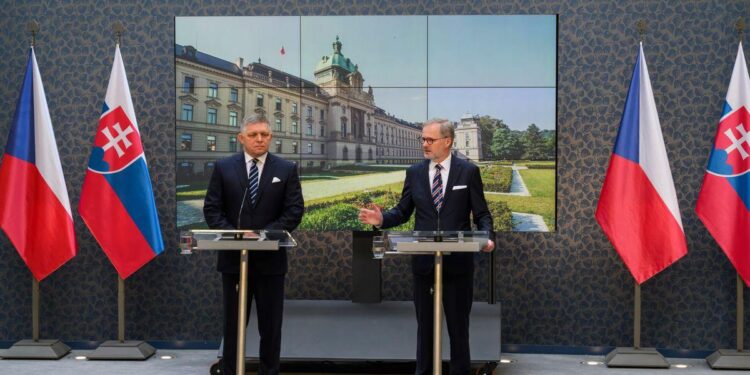Relations between the Czech Republic and Slovakia have taken a sharp downturn, reaching what analysts describe as a “glacial” low point. Once close allies forged by shared history and membership in the European Union, recent political disputes and diplomatic tensions have unsettled the partnership between the two Central European neighbors. This article examines the key factors contributing to the cooling of Czech-Slovak ties and explores the potential ramifications for regional cooperation.
Czech-Slovak diplomatic ties face unprecedented tension amid political disputes
The diplomatic landscape between the Czech Republic and Slovakia has entered a period marked by heightened friction, stemming from a series of political disagreements that have unsettled years of cooperative calm. Recent disputes over cross-border policies, economic collaborations, and differing stances on regional security measures have created an atmosphere of mistrust rarely seen in the post-Czechoslovak era. Both nations, traditionally bound by shared history and cultural ties, now find themselves navigating a complex web of diplomatic challenges that threaten to redefine their bilateral relationship.
Key points fueling the diplomatic chill include:
- Clashing approaches to EU policy alignment, especially on energy and migration.
- Contentious debates over joint infrastructure projects and funding allocations.
- Disagreements on diplomatic appointments and cross-border cooperation mechanisms.
| Issue | Czech Position | Slovak Position |
|---|---|---|
| Energy Policy | Favor EU Green Deal | Prioritize National Energy Security |
| Border Infrastructure | Accelerate Cross-Border Projects | Demand More Transparency in Funding |
| Migration Policy | Support Quota System | Oppose Binding Quotas |
Economic and cultural cooperation stalls as mistrust deepens between Prague and Bratislava
Recent developments between Prague and Bratislava have revealed a decisive halt in economic initiatives that once symbolized robust cooperation. Joint ventures in technology and infrastructure face growing skepticism, with bureaucratic delays and conflicting national priorities undermining projects that promised mutual growth. Trade negotiations, previously marked by optimism, are now stalling amid accusations of protectionism and unfair market practices. Industry leaders from both sides report a growing reluctance to collaborate, citing an atmosphere thick with suspicion and political posturing.
On the cultural front, exchanges that once fostered a shared Central European identity have diminished sharply. Festivals, academic partnerships, and linguistic programs have all experienced cutbacks, signaling a retreat from years of cross-border cultural synergy. Key factors contributing to this downturn include:
- Heightened nationalistic rhetoric disrupting public sentiment.
- Political maneuvering in both capitals prioritizing domestic agendas.
- Media narratives amplifying mistrust and past grievances.
| Sector | Previous Cooperation | Current Status |
|---|---|---|
| Technology | Joint research programs | Suspended |
| Trade | Open market agreements | Negotiations stalled |
| Cultural Exchange | Biannual festivals | Reduced frequency |
Experts call for renewed dialogue and confidence-building measures to defrost bilateral relations
Amid escalating tensions, prominent analysts and former diplomats are urging both Prague and Bratislava to prioritize open channels of communication. They stress the importance of initiating bilateral talks aimed at rebuilding trust and addressing contentious issues that have frozen cooperation between the two neighbors. Historical ties and shared interests, they argue, provide a solid foundation upon which fresh diplomatic efforts can restore mutual understanding.
Experts propose several confidence-building measures to thaw the diplomatic standstill, including:
- Regular workshops involving civil society organizations
- Joint cultural and educational initiatives to foster people-to-people connections
- Establishment of a bilateral crisis hotline for immediate diplomatic dialogue
| Proposed Measure | Expected Impact |
|---|---|
| Joint media campaigns | Combat misinformation and build positive narratives |
| Cross-border infrastructure projects | Strengthen economic interdependence |
| Cultural exchange programs | Promote mutual understanding and heritage appreciation |
Future Outlook
As Czech-Slovak relations continue to deteriorate, the once-close partnership between the two neighbors faces unprecedented challenges. Diplomatic efforts will be crucial in thawing recent tensions and restoring the cooperative spirit that has long defined their shared history. Observers now watch closely to see whether political leaders can bridge divides or if the chill between Prague and Bratislava will persist, reshaping the future of Central European alliances.
















